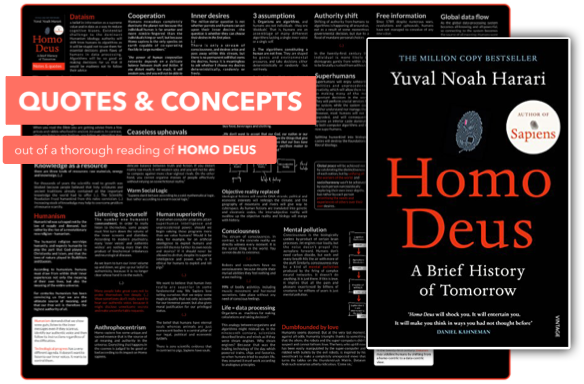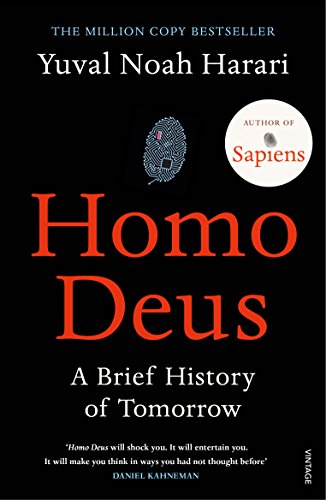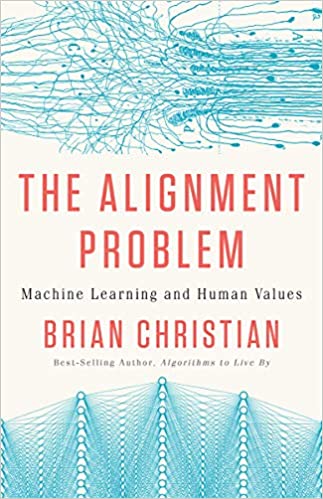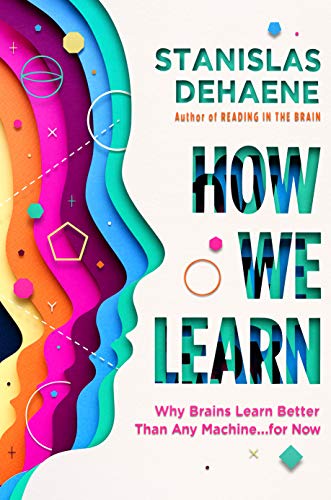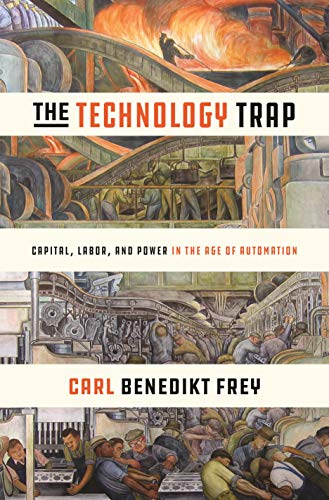Homo Deus is a book I would recommend to anyone who wants to refine their thinking about the future. Knowing his previous books already I knew what to expect, yet was surprised by the clarity and depth of his thinking.
Harari has extended his evolutionary concepts to go beyond his “Sapiens” bestseller of 2016, and as a historian is doing it uncompromisingly. The concepts he’s coming out with are mind-boggling. As David Sexton wrote in a review published in the Evening Standard: “Compared with the subjects he (Harari) tackles, anything else we might read looks piffling and parochial.”
How else could you describe concepts where humans are framed as units of a giant computational algorithm, or religions as virtual reality games of our imagination with a scoring system to get you to next level in the afterlife?
His insights can come as blasphemous for those of us who are used to seeing the world through the lens of human superiority (usually called anthropocentrism). Harari states clearly that we’re biased by definition, as our narrative-self making sense of the world is incompatible with the very fabric of reality. The latter doesn’t come in the shape of a story.
Quotes & concepts
Here’s what I’ve learned from my reading of the book:
Core concepts of the book:
- Dataism. A belief in information as a supreme value and in data as a way to reduce cognitive biases. Algorithms will be so good at making decisions for us that it would be madness not to follow their advice.
- Religion as a vast virtual reality game with imaginary rules that give life meaning by scoring points to get to a new level. After humans silenced the gods during the Scientific Revolutions, they became a one-man show and lost meaning in the process. Meaning might be regained in the virtual realities of the future.
- Consciousness as a biologically useless by-product of certain brain processes (a mental pollution as carbon dioxide from breathing). 99% of bodily activities don’t require consciousness. Algorithms of the future (the “system”) won’t require consciousness to be superior. Superhumans (cognitively upgraded ones) will perform services to “the system” while the system could neither understand nor manage them.
- Humans as masters of cognitive dissonance with their fictions of intersubjective reality. Sapiens rule the world thanks to an intersubjective web of meaning (law, forces, entities, places that exist only in our imagination). Our cooperation is dependent on a delicate balance between truth (reality) and fiction (distorting reality). Beliefs in the same stories make us follow the same rules, making it easy to predict behaviors. Fictions and stories in our heads give us meaning, not all bad, rather vital (we can’t play football unless everyone believes in the same made-up rules). Harrari goes so far to predict that the intersubjective reality (of fiction and stories) will swallow up the objective reality and he suggests to decipher the fictions to predict the future and meanings we’ll strive for.
- The Cosmic data-processing system where humans as merely tools for creating the Internet-of-all-things, which may eventually spread out from planet Earth to pervade the whole galaxy or universe. Organisms are seen as algorithms, shaped by natural selection (algorithmic calculations are not affected by material from which the calculator is built). In this context freedom of information seems the greatest good of all – a completely new value, first to appear since 1789. The greatest sin is to block the flow of data, which for humans means not sharing or death (a condition in which information doesn’t flow).
- Knowledge as a resource among Energy and raw materials. The stock of knowledge constantly increases with this rule: the more you use – the more you have. Data as a starting point for knowledge – in ancient times having power meant having access to data. Today having power means knowing what to ignore.
- AI making people irrelevant. As humans, we do have 2 abilities (physical and cognitive). We gave up competition in physical abilities to machines already, now machines might outcompete us in cognitive abilities and there’s no third field. Migration between a low-skill job (farming) to another low-skill job (cashier) will not happen in future. Low-skill jobs will disappear and thus in a world of superhumans, our dreams and even fears will become irrelevant, creating a useless class with nothing more to contribute
Homo Deus
by Yuval Noah Harari
⭐⭐⭐⭐⭐
Published: Sep 2016
Length: 460 pages
Time to read: 10h
Related books
- Mar 2, 2021Jeff Hawkins and his team discovered that the brain uses maplike structures to build a model of the world-not just one model, but hundreds of thousands of models of everything we know, and the origin of high-level thought
- Oct 30, 2020How computer scientists and philosophers are defining the biggest question of our time - how will we create intelligent machines that will improve our lives rather than complicate or even destroy them?
- Sep 19, 2020How to integrate data teams into organization in an effective way, enabling executive data science practices.
- Jan 11, 2020An illuminating dive into the latest science on our brain's remarkable learning abilities and the potential of the machines we program to imitate them
- Jun 18, 2019An insightful exploration of the relationship between technological advances and work, from preindustrial society through the Computer Revolution.
